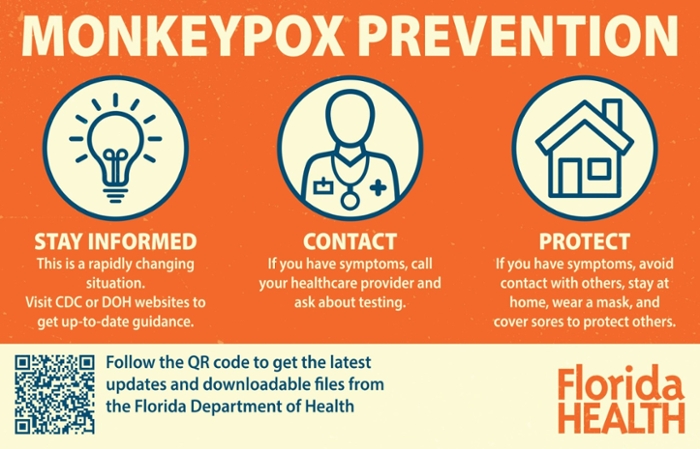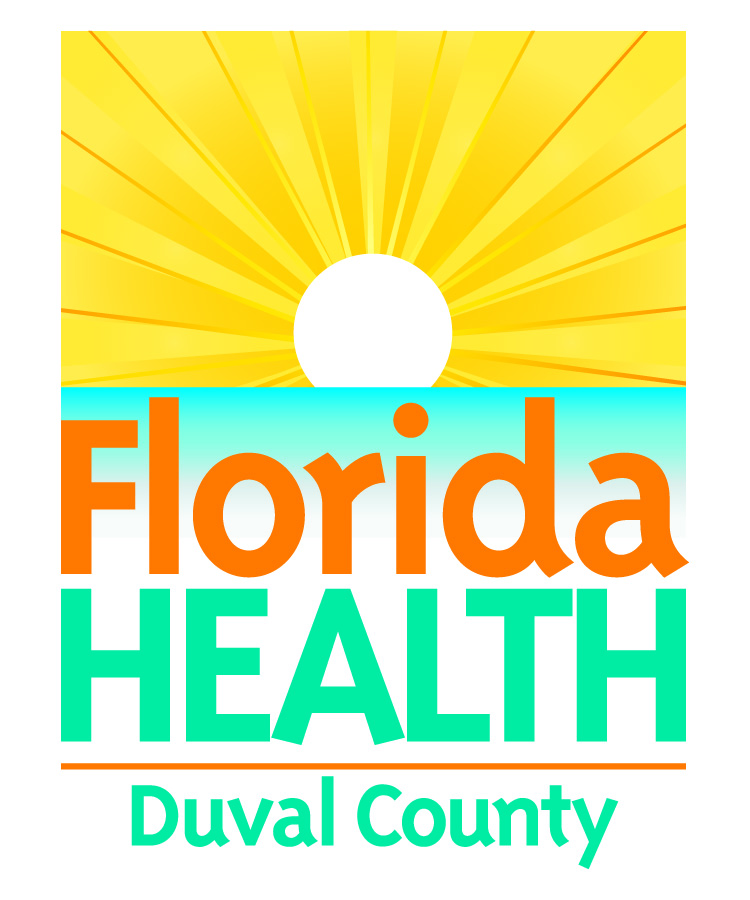MONKEYPOX INFORMATION
Monkeypox Basics
Monkeypox is a virus that is part of the same family of viruses as the variola virus (the virus that causes smallpox).
- It is rarely fatal.
- It is not related to chickenpox.
Symptoms
- Fever
- Headache
- Swollen lymph nodes
- Chills
- Muscle aches
- Back ache
- Exhaustion
- A rash that can look like pimples or blisters
- How it Spreads
- Prevention
- People more likely to get monkeypox include:
- Vaccine Availability
- Screening and Consent Form
- Vaccine Implementation Plan
- Information for Providers
- CDC Monkeypox Information Page
- Direct contact with the infectious rash, scabs, or body fluids
- Respiratory secretions during prolonged, face-to-face contact, or during intimate physical contact, such as kissing, cuddling, or sex
- Touching items (such as clothing or linens) that previously touched the infectious rash or body fluids
- Pregnant people can spread the virus to their fetus through the placenta
- Avoid close, skin-to-skin contact with people who have a rash that looks like monkeypox.
- Do not touch the rash or scabs of a person with monkeypox.
- Do not kiss, hug, cuddle or have sex with someone with monkeypox.
- Do not share eating utensils or cups with a person with monkeypox.
- Do not handle or touch the bedding, towels, or clothing of a person with monkeypox.
- Wash hands often with soap and water or use an alcohol-based hand sanitizer.
- In Central and West Africa, avoid contact with animals that can spread monkeypox virus, usually rodents and primates. Also, avoid sick or dead animals, as well as bedding or other materials they have touched.
- If an individual has monkeypox:
- Isolate at home.
- If they have an active rash or other symptoms, stay in a separate room or area away from other people or pets you that they live with.
- People who have been identified by public health officials as a contact of someone with monkeypox
- People who are aware that one of their sexual partners in the past 2 weeks has been diagnosed with monkeypox
- People who had multiple sexual partners in the past 2 weeks in an area with known monkeypox
- People whose jobs may expose them to orthopoxviruses, such as:
- Laboratory workers who perform testing for orthopoxviruses
- Laboratory workers who handle cultures or animals with orthopoxviruses
- Some designated healthcare or public health workers
Duval County is now in Phase 3.
Individuals are encouraged to contact their primary care provider or a Ryan White provider to be vaccinated.
If an individual does not have a primary care provider or their primary care provider is not participating, another option to get vaccinated is by scheduling an appointment with any Federally Qualified Health Center (FQHC) or the Florida Department of Health in Duval County. These locations are providing vaccines by appointment only.
Florida Department of Health in Duval County
(904) 253-1130
Agape
(904) 760-4904
Sulzbacher
(904) 394-8069
- Vaccines are being provided to physicians/clinicians in the community (that make the vaccination request)
- Both the Hepatitis A vaccination and the quadrivalent meningococcal disease vaccination can be administered at the same time as the monkeypox vaccine
The implementation plan for monkeypox vaccine distribution will consist of three phases. During Phases 1 and 2, CHDs will coordinate monkeypox vaccine distribution with local health care providers.
Phase 1
During Phase 1, the following groups will be prioritized:
- Laboratory personnel and select health care personnel at high risk for monkeypox
- Close contacts of monkeypox cases who are identified via case investigation and contact tracing.
- Immunocompromised MSM with HIV (< 200 CD4 white blood cells per ml3) with potential exposure
- Other MSM with a recent history of a sexually transmissible disease (STD)
Phase 1 will have the following vaccination partners:
- Florida CHDs
- Ryan White (RW) clinics
- STD clinics
- Other community providers designated by CHDs who serve MSM with HIV
Phase 2
Phase 2 will occur when additional monkeypox vaccine becomes available from the strategic national stockpile for distribution through CHDs. During Phase 2, all Phase 1 groups will be prioritized in addition to the groups in bold:
- Laboratory personnel and select health care personnel at high risk for monkeypox
- Close contacts of monkeypox cases
- Immunocompromised MSM with HIV (< 200 CD4 white blood cells per ml3) with potential exposure
- Other MSM with a recent history of an STD
- All other MSM with HIV who had potential exposure
Phase 2 will have the same vaccination partners:
- Florida CHDs
- RW clinics
- STD clinics
- Other community providers designated by CHDs who serve MSM with HIV
Phase 3
Phase 3 will occur when monkeypox vaccine is distributed through normal vaccine distribution channels. During Phase 3, all Phase 2 groups will be prioritized in addition to the groups in bold:
- Laboratory personnel and select health care personnel at high risk for monkeypox
- Close contacts of monkeypox cases
- Immunocompromised MSM with HIV (< 200 CD4 white blood cells per ml3) with potential exposure
- Other MSM with a recent history of a sexually transmissible disease
- All other MSM with HIV who had potential exposure
- All MSM
- Other high-risk groups
Phase 3 will have the same vaccination partners as Phase 2 in addition to those in bold:
- Florida CHDs
- RW clinics
- STD clinics
- Other community providers who serve MSM with HIV
- Community providers who serve MSM and other high-risk groups
- Both the Hepatitis A and quadrivalent meningococcal disease vaccinations can be administered simultaneously with the monkeypox vaccine. Information will be disseminated to health care providers about the importance of vaccinating MSM for these three diseases.
- One product (tecovirimat or TPOXX) is approved by United States Food and Drug Administration and is available to health care providers under a “compassionate use” protocol held by CDC. The Florida Department of Health will provide training to Florida health care providers likely to have monkeypox cases on the use of TPOXX.
- You or your facility must be registered in FL Shots as a VFA (vaccines for adults) provider for DOH-Duval to transfer vaccine. Being a VFA provider will allow for your facility to have a pin number for transfer and will allow the information to be input into FL Shots for accountability.
- To enroll, please call 877-888-7468.
- To request vaccines, please coordinate with your local County Health Department.
- Keep in mind that vaccines will be distributed within the community as vaccine becomes available.
- If you identify a potential case of monkeypox, please refer to the reporting guidelines to notify the County Health Department. The team will then provide next steps on specimen collection and application submission for treatment.
- Community members that reach out to the County Health Department wishing to be vaccinated will be referred to their PCP or the provider that is managing their antiretroviral medications for evaluation for potential vaccination.
- Vaccination supply received must take into consideration that the JYNNEOS vaccine is administered as two-dose series 4 weeks apart.
Visit the CDC website for more information on monkeypox vaccines.


